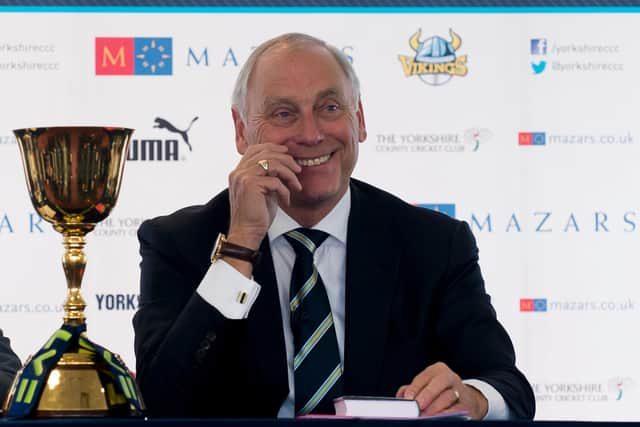Colin Graves at Yorkshire CCC: What’s so good about members’ clubs anyway? Chris Waters comment
“I want to make it clear that there are no discussions or plans to change the mutual status of YCCC,” he wrote to members ahead of an extraordinary general meeting at Headingley on February 2 that would confirm his return to the club as chair.
“However, in the changing and challenging arena of both UK and world sport, nothing can be ruled out in the future.
Advertisement
Hide AdAdvertisement
Hide Ad“At all times we will ensure that the rights of all YCCC members to watch all professional cricket in Yorkshire will be maintained.”


In other words, Graves and his new consortium insist that they have no plans to sell Yorkshire CCC and to take the club out of members’ control – but do not rule that out going forward.
Indeed, a betting man might be inclined to put a wager on it happening sooner rather than later, such is the “changing and challenging arena” of which Graves speaks.
With Hampshire (one of three counties along with Durham and Northants not owned by members) set to become the first county to be sold to an overseas franchise (Delhi Capitals), the move towards outside investment could soon become a movement.
Advertisement
Hide AdAdvertisement
Hide AdParticularly so for Test and Hundred-hosting clubs such as Yorkshire, perhaps, none of which may be owned by their members a few years from now.


This, in fact, has emerged as the key issue concerning Graves’ prospective comeback – more so, perhaps, than that comeback per se, for which a two-thirds majority of members’ votes is needed, and a racism crisis that was supposedly never about individuals or, one might have wondered, apart from in his case, such has been the torrent of criticism he has taken.
While you ponder that anomaly, it is by definition the fact that Yorkshire’s members retain the control to veto any move to take that control away (for the record, 75 per cent would have to vote in favour of a change of status, a vote in which half of the membership would have to participate).
My question, though, is why does any of this matter? Indeed, what’s so good about members’ clubs anyway?
Advertisement
Hide AdAdvertisement
Hide AdThe answer, presumably, lies in their power, or at least in their perceived power, of being able to support, thwart, challenge and to hold an organisation and officials to account.
There is a certain pride and affinity attached to it, too; members not only have a voice but one seemingly central to decisions and strategy.
In reality, though, isn’t it just an increasingly archaic concept in that “changing and challenging arena”, one useful in principle but toothless in practice?
For what control have members really got, not just Yorkshire’s, in the way that cricket has changed in recent times, from the marginalisation of the County Championship to the introduction of Graves’ very own Hundred?
Advertisement
Hide AdAdvertisement
Hide AdYes, a bit of collective arm-waving and throat-clearing has led to the odd win here and there, some more significant than others, but the war in terms of the direction of travel for the red-ball game especially has long been lost, the format that most of the members holddear.
Nor is members’ control a guarantee of financial stability (Yorkshire have been fighting a hand-to-mouth existence since I first darkened this space 20 years ago) or even success on the field (they have won only two trophies during that time).
Wouldn’t overseas involvement (however unpalatable for those who would prefer cricket not to have changed at all) help to safeguard Yorkshire’s future and potentially lead to more on-field success? Let’s face it, the club could hardly be in a worse state in either respect.
There is also a question of requisite competence.
Many members are as sharp as a knife – much sharper than the blunt instrument that pontificates here before you – but are they experts in matters of insolvency, administration and high finance, for example?
Advertisement
Hide AdAdvertisement
Hide AdWere they sufficiently diligent in their probings of Lord Kamlesh Patel, the previous chair, whose actions have led to much of the chaos, and whose reforms they simply waved through at meetings from which the press was excluded? Did members step up generally at the height of the crisis – at least those who hadn’t left in disgust/disbelief?
Some fear what might happen should Yorkshire lose member status, but what are they afraid of?
Of no longer being beholden to one man and his family trust, a man whose generosity has helped keep the club afloat?
Of being unable to prevent the sidelining of a Championship already sidelined, of being unable to see England players only rarely seen anyway?
Advertisement
Hide AdAdvertisement
Hide AdGranted, there is always a risk with any outside interaction, but with members as stakeholders, thus still having the ability to hold to account, it would be more a pragmatic necessity than a dystopian vision.
Comment Guidelines
National World encourages reader discussion on our stories. User feedback, insights and back-and-forth exchanges add a rich layer of context to reporting. Please review our Community Guidelines before commenting.